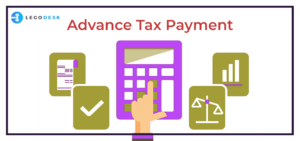Advance Tax Payment
What is Advance Tax
Advance Tax or advance income tax is a type of Income-tax. It should be paid in 4 installments in a financial year. It is a concept where the government collects income tax revenue on a regular basis to ensure that they have the cash flow entire year.
The Income Tax Act has provisions and procedures for payment of advance tax. Section 208[1] of the Income Tax Act deals with the concept of payment of advance tax. According to this section, any person who has an estimated tax liability of ten thousand or more in a year is liable to pay advance tax. This concept is generally called as an advance tax payment. Section 243C[2] of the Income Tax Act deals with the delay in remitting advance tax payment or the interest payable for late payment of advance tax.
Advance Tax applicability Who needs to pay Advance Tax?
Section 208[3] of the Income Tax Act deals with the procedure for payment of advance tax for individuals. According to this section, any person whether individual, company, trust, partnership or LLP having tax liability rupees ten thousand or more, needs to pay advance tax. Senior citizens who do not run any business are exempted from advance tax payment in some scenarios.
Due dates to pay Advance Taxes
Section 211[4] of the Income Tax Act deals with the due dates for paying advance taxes. The advance tax can be paid in four installments over the financial year.
| Due Date of Payment | Tax Payable |
| June 15 | 15% of the total tax |
| September 15 | 45% of the total tax |
| December 152 | 75% of the total tax |
| March 15 | 100% of the total tax |
Related Provisions of Income Tax act Regarding Payment of Advance Tax
Here are some related provisions of the Income Tax Act regarding the concept of advance tax payment. Chapter XVII, Section 207 to section 219[5] of the Income Tax Act deals with the concept of advance tax payment.
| Sections | Details |
| 207 | Liability for payment of advance tax. |
| 208 | Conditions of liability to pay advance tax. |
| 209 | Computation of advance tax. |
| 209A | [Omitted.] |
| 210 | Payment of advance tax by the assessee of his own accord or in pursuance of order of Assessing Officer. |
| 211 | Instalments of advance tax and due dates. |
| 212 | [Omitted.] |
| 213 | [Omitted.] |
| 214 | Interest payable by Government. |
| 215 | Interest payable by assessee. |
| 216 | Interest payable by assessee in case of under-estimate, etc. |
| 217 | Interest payable by assessee when no estimate made. |
| 218 | When assessee deemed to be in default. |
| 219 | Credit for advance tax. |
How to file Advance Tax
One can pay an advance tax payment with the use of tax payment challan. These challans for paying advance tax are generally available at bank branches. Although, not all banks are able to give those challans. The banks are selected by the Income Tax Department. One can deposit the challan of advance tax payment to the authorized branches of banks only. One can also make the advance tax payment online via the National Securities Depository site or the IT department site.
Assessment by Income Tax Officer
Where a taxpayer fails to make the payment of advance tax or pays lower than the required amount to be paid as advance tax and has already been assessed by way of regular assessment in respect of total income of any previous year, the Assessing officer has the power to pass an order under section 210(3)[6].
If anyone misses the due date for payment of advance tax then the person is liable to make payment of interest on the sum that comes to one percent simple interest monthly on the amount defaulted for three months.
If the tax payer’s estimate advance tax is lower than the estimate of the Assessing Officer, then the taxpayer can submit his own estimate of current income/advance tax to the Assessing Officer and the intimation to the Assessing officer is mandatory.
Can a person avoid the Payment of Advance Tax?
The advance tax payment of income tax can be avoided in some cases. It is possible if the taxpayer reports additional income to the payroll department at the employer organization. In this type of situation, the additional income reported by the taxpayer will be deducted from the salary of the taxpayer by the employer directly. The additional amount of income reported by the taxpayer, need to be adjusted by the employer on the TDS in such cases. Although, in many cases, the taxpayer generally don’t inform the additional income information to the employer and chooses to pay the advance tax by own.
[1] The Income Tax Act 1961, s208
[2] Ibid s243C
[3] Ibid s208
[4] Ibid s211
[5] Ibid ss207-219
[6] Ibid s210(3)
Try our Debt Resolution solutions today Request a Demo
